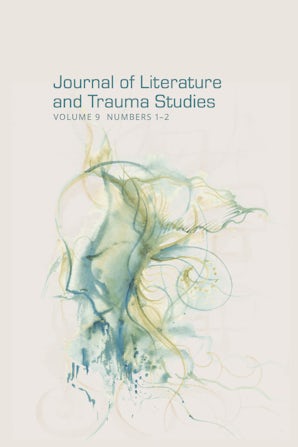
Submissions
Manuscripts should be prepared in accordance with the most recent edition of the Chicago Manual of Style. JLTS only accepts electronic submissions. Please submit your manuscript by e-mail as an attachment, preferably as a Microsoft Word document, and supply with it an abstract of a hundred words or fewer. Images may be submitted electronically as TIFFs or high-quality JPEGs of at least 300 dpi. Since images take up space normally reserved for text, please keep any such materials to a minimum. All articles and reviews should be double-spaced, including notes. For more specific guidelines please see our submission page online at http://www.jlts.stir.ac.uk/submissions. Submissions should be sent directly to David Miller and Lucia Aiello at litandtrauma@gmail.com.
David Miller, Manchester Metropolitan University
Lucia Aiello, University of York
Derek Attridge, University of York
Vladimir Biti, University of Vienna
Cathy Caruth, Cornell University
Stef Craps, University of Ghent
John Drakakis, University of Stirling
Robert Eaglestone, Royal Holloway, University of London
Terry Eagleton, Lancaster University
Shoshana Felman, Emory University
Andreas Huyssen, Columbia University
Jane Kilby, University of Salford
Roger Luckhurst, Birkbeck College
Antony Rowland, Manchester Metropolitan University
Damian Shaw, University of Macau
David Shepherd, Keele University
Olga Taxidou, University of Edinburgh
Galin Tihanov, Queen Mary, University of London
Dale Townshend, Manchester Metropolitan University
Sue Vice, University of Sheffield
Elisabeth Weber, University of California, Santa Barbara
Anne Whitehead, Newcastle University
Trending Articles - Summer 2021
"'To Learn to Live without Alternatives:' Forgetting as Remembering in Christa Wolf’s The City of Angels; or, The Overcoat of Dr. Freud" (Vol. 3 No. 1, 2014)
"'The Grey and the Coloured Truth:' Memory and Post-memory in George Tabori’s Holocaust Plays" (Vol. 3 No. 1, 2014)
"From the Position of the Victim to the Position of the Witness: Traumatic Testimony" (Vol. 3 No. 1, 2014)
"'Every Moment Is Two Moments:' Witnessing and the Poetics of Trauma in Fugitive Pieces, by Anne Michaels" (Vol. 3 No. 1, 2014)
"Traumatic Memory and Bodily Inscription in Georges Perec’s W; ou, Le souvenir d’enfance and Philippe Grimbert’s Un secret" (Vol. 3 No. 1, 2014)
This reading list is full of academic articles for both instructors & students seeking peer-reviewed materials on Rape Culture, Sexual Help, Models of Resistance, and other areas of study.
Reading List: MigrationThis list of peer-reviewed materials features articles on many topics spanning Globalization, Genocide, Religion, Diaspora Communities, and other aspects on the topic of Migration.
Click the link above to view this journal's advertising rates & options!
Libraries face a dilemma: the number of books, journals, and other information resources available to offer to their patrons is growing faster than their acquisitions budgets. Decisions about which new materials to add in a given year are influenced by a number of factors, not the least of which are whether they are aware of the existence of a resource and the value that resource would bring to those who rely on the library. Librarians often appreciate the input of users in gathering the information they need to make those evaluations. There is no one right way to share information about a particular journal with a library. Some institutions have formal procedures for submitting acquisition requests, others rely on regular communication between subject area librarians and the departments they serve, and some have no specifically defined method. You are in the best position to determine the most appropriate method for approaching your library with a request for the addition of a journal to its collection. However, we have developed a library recommendation form as one tool you can use to provide your library with relevant information. The form contains basic information about the journal: a description, its print and electronic ISSNs, frequency of publication, pricing, print and electronic options, and ordering information. It also includes a few questions for you to complete that address your evaluation of the journal's value. If you choose to use the form, fill it out then send it to the appropriate individual at your library. Do not return it to the University of Nebraska Press.